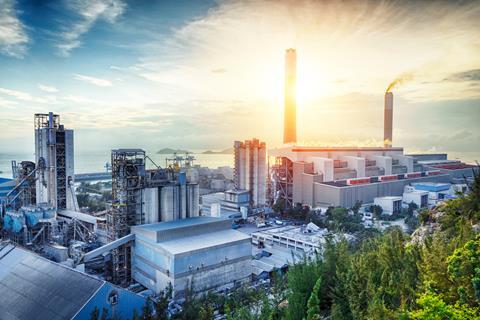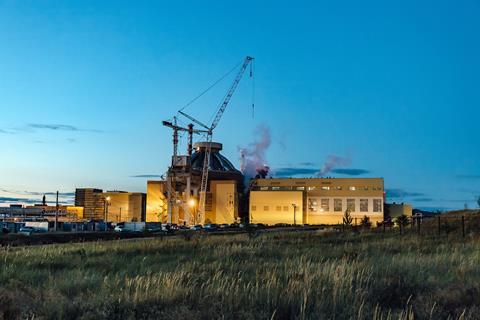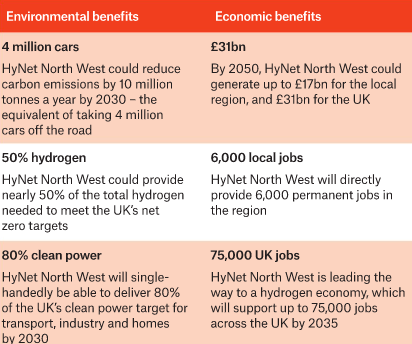Can hydrogen help to unlock a low carbon future in the UK? Thomas Hawley, director at Gleeds, explores
The UK government is turning to the most abundant elementin the universe, hydrogen, to provide a cleaner power source to industries that are hard to electrify. Clean hydrogen production and the use of hydrogen as a power source is going to play a key part in both the UK and global ambitions to achieve net zero carbon emissions by 2050 or sooner.
Hydrogen is a story of two sides when it comes to clean energy. The first is commonly known: that hydrogen is used extensively across the petrochemical industries with around half of global annual production utilised to manufacture nitrogen fertilisers, with a further quarter used to refine crude oil into liquid transport fuels. Of the circa 90 million tonnes of hydrogen used in 2020, 90% was produced by unabated fossil fuels and no technologies were used to mitigate the emissions of greenhouse gases (GHGs), such as carbon capture, utilisation and storage (CCUS).
But there is another side to its story. Alongside its industrial uses, hydrogen can also be employed as a fuel for electricity generation, which emits no GHGs when combusted, unlike its hydrocarbon counterparts. While hydrogen use in power generation represents only 0.2% of the current electricity supply, the IEA forecasts that by 2050 hydrogen-produced power could represent approximately 12% of the global net zero energy production capacity.

Hydrogen-produced power – the new way
In August 2021, the UK government published its Hydrogen Strategy, establishing a target to deliver 5GW of low carbon hydrogen production capacity by 2030, with 1GW of that capacity installed by 2025.
To achieve this, a significant programme of works is required to repurpose some of the existing 7,660km of the UK’s gas pipelines and connect them to the developing low carbon industrial clusters on the west and east coasts. This will be delivered through the National Grid’s Project Union, which owns and operates the National Transmission System, the UK’s gas transmission network. National Grid is planning to develop a hydrogen backbone in the UK by 2040 and be a key enabler as the UK grows into a low carbon economy.
Who is leading the way with low carbon hydrogen in the UK?
In the UK, the low carbon clusters in the North-west and North-east of England are leading the way, with early backing from the UK government. In Scotland, plans have been published and are being implemented to build a hydrogen economy and diversify away from oil and gas.
More specifically, the HyNet North West and East Coast Cluster developments are leading the way. With HyNet North West backed by companies including Eni, Essar and Cadent; and the East Coast Cluster backed by BP, Equinor, National Grid, Shell and Total, it is clear the major players in oil and gas are backing hydrogen as a key industry in the mission to decarbonise.

Case study – HyNet

What is HyNet?
HyNet North West is one of the projects that Gleeds is currently supporting. We are helping Hynet North West in their mission to produce, transport and store hydrogen, and at the same time capture, use or storge any carbon emissions from this process.
HyNet North West is made up of several elements, but at its core it will see a significant upgrade of existing petrochemical refining facilities and the conversion of sections of the national grid from natural gas to hydrogen, and construction of new infrastructure to decarbonise the North-west and north Wales.
Who is the client?
Essar is a key partner and major investor in HyNet North West, working in a consortium with Progressive Energy known as Vertex Hydrogen. Gleeds has worked with Essar for a number of years, delivering many successful projects.
What is the problem it solves?
The North-west of England and north Wales industrial zones are a major contributor to carbon emissions in the region. By providing a local source of clean hydrogen with the infrastructure to transport it to local companies, HyNet North West will drastically decarbonise industry in these regions. HyNet North West will also provide clean hydrogen as a sustainable transportation fuel source, as an alternative to carbon intense fossil fuel alternatives.
What is Gleeds’ role?
Gleeds is providing expert contract and procurement services to help HyNet North West develop robust strategies and facilitate the award of the various agreements through the supply chain to make the project and its intended benefits a reality.
What are the proposed outcomes/benefits of HyNet Nort West?

Household brands trial running their plants on hydrogen
So, what is next for hydrogen? Well-known brands Pepsico, Heinz, Kelloggs, Essity and Novelis have been selected for funding by the government to review the feasibility of switching their North-west plants to run on hydrogen.
The programme, named HyNet Industrial Fuel Switching, will provide evidence to enable major manufacturing sites to switch to low carbon hydrogen from HyNet. This will enable decarbonisation of a range of industry sectors, making a critical contribution to the UK’s journey to net zero.
Each site will design projects to demonstrate how hydrogen can be used to fuel their processes. The next phase of the programme, run by the Department of Business, Energy and Industrial Strategy (BEIS), will fund the physical hydrogen demonstrations – in which the sites are run on hydrogen.
Thomas Hawley is a director at Gleeds, a leading global property and construction consultancy, independent since 1885. The company has successfully delivered many of the world’s most exciting construction projects on time and on budget.
Gleeds Energy is an industry recognised, specialist arm of the business, with a proven track record of delivery within renewables, nuclear, oil and gas, as well as hydrogen and CCUS.


























